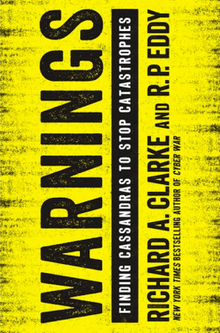Warnings (book)
 | |
| Author | Richard A. Clarke and RP Eddy |
|---|---|
| Country | United States |
| Language | English |
| Genre | History, non-fiction |
| Publisher | Harper Collins |
Publication date | 2017 |
| Media type | Print (hardback) |
| ISBN | 978-0-06-248802-2 |
Warnings: Finding Cassandras to Stop Catastrophes is a book published by HarperCollins Ecco and written by former United States intelligence and counterterrorism official Richard A. Clarke, and former White House National Security Council Director, and U.S. and UN senior diplomat RP Eddy.[1] The book offers a framework, "The Cassandra Coefficient," to help determine which warnings decisions makers should look into more closely, and if some warnings deserve less attention. The case studies range from national security, to threatening technologies, to the global economy, to climate change and speculates on various potential threats to civilization.
Content
The authors cover seven case studies in which data driven, proven, credible experts specifically warned of a pending catastrophe, were ignored by the decision makers, and the disaster subsequently struck just as predicted. The authors call these seers, "Cassandras" after the Greek mythological figure who could foretell disaster but was cursed to never be believed. The authors propose a method to separate accurate predictions of danger from inaccurate doomsayers, "The Cassandra Coefficient." They then investigate experts who today are warning of future disasters—the threats from artificial intelligence, bio-hacking, mutating viruses, and more—and whose calls are not being heeded.[2]
The concluding chapter describes how individuals and organizations can employ the Cassandra Coefficient, hedging and "sentinel intelligence," to watch potential disasters so as to not be surprised by them, and expend the necessary remediative resources only when necessary.
Reception
Warnings was lauded and recommended by President Bill Clinton (who noted it on his recommended reading list),[3] Henry Kissinger, Sen. George Mitchell, Gen. Michael Hayden, Commissioner William J. Bratton, Lawrence Wright, and other notables.
It was a Publishers Weekly best seller, and the #1 Best Seller on Amazon in four categories. The book enjoyed positive reviews in The Washington Times,[4] Real Clear Life,[5] Kirkus, and on Good Morning America, the Tucker Carlson Show on Fox, and numerous other venues.
In her book What Happened and subsequent interviews, Hillary Clinton referred to Warnings and noted the value the Cassandra Theory could have had to encourage decision makers to take the Russian hacking threat in the 2016 U.S. Presidential election more seriously.
References
- ↑ "Amazon.com".
- ↑ "Harpercollins.com".
- ↑ Hess, Abigail (10 August 2017). "12 books Bill Clinton hopes you'll enjoy reading as much as he did". CNBC.
- ↑ Sinai, Joshua (June 5, 2017). "BOOK REVIEW: 'Warnings: Finding Cassandras to stop Catastrophes'". The Washington Times.
- ↑ "'Warnings' Delivered by New Book: Ignoring 'Cassandras' Is Inviting Extinction". RealClearLife. 24 May 2017.